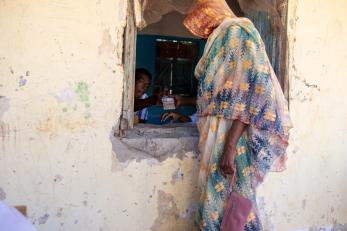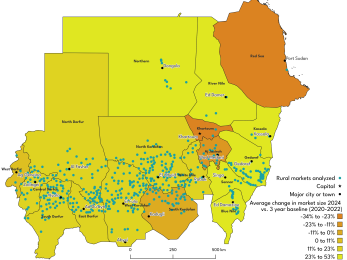Time Is Running Out: Stopping a Downward Spiral Into Conflict-Induced Hunger

Despite repeated warnings, the risk of famine looms large in Sudan, ignored amidst brutal conflict. While the latest reports indicate that by February 2024 an estimated 17.7 million people were already facing severe hunger, recent alerts from both the Famine Early Warning Systems Network and Integrated Food Security Phase Classification (IPC) warn that these numbers are now likely much worse.
Several areas across the country face real risks of famine in the ongoing lean season unless immediate action is taken to scale up the humanitarian response.
People are already facing starvation. This is not a distant, abstract crisis—it is a stark reality unfolding before our eyes. Horrifyingly, nearly 230,000 children, pregnant women, and new mothers could die in the coming months due to hunger. With each second that passes without a humanitarian response that meets the scale of needs, the cost in lives lost increases.
Agriculture Sector Decimated
The devastating impacts of conflict on agriculture cannot be overstated. Between 60% and 80% of the population, including many women, rely on agriculture for income, and food production is vital to food security. Sudanese farmers report that a combination of conflict-related factors has contributed to reduced agricultural activity, including insecurity or attacks on their land, fuel price hikes, and their inability to purchase seeds.
Harvests plummeted by 46% in 2023, with the most significant declines in regions with high conflict intensity, especially West Darfur. While the outlook is bleak, Mercy Corps’ teams have recently assessed through remote sensing analysis that upcoming favorable weather projections provide an opportunity to increase support to farmers ahead of the planting season. These efforts will help boost food production ahead of the next harvest season.
Obstructed Humanitarian Access and Aid Challenges
Access constraints, mostly fueled by insecurity and bureaucratic hurdles, continue to hinder the provision of principled humanitarian assistance. As a result, “traditional” in-kind aid is not reaching the millions of people who desperately need it, pushing them closer to starvation every day.
The humanitarian response requires an urgent rethink. We must work through the local groups and markets on which people rely most to survive and eventually rebuild their lives in dignity. While markets have been impacted by the conflict, including through looting and attacks, they remain active in many areas. The main challenge is affordability of goods. In March 2024, reports showed that 94% of internally displaced people could find food in markets but not afford it.
Community-based organisations are another essential lifeline for people in need. They facilitate initiatives that address multiple urgent needs, including food, health, and protection. Supporting their work is now more critical than ever, but these groups face growing security challenges and lack comprehensive global support.
It is essential that the international community applies more diplomatic pressure on conflict parties. They must ensure respect for their obligations under international humanitarian law, including facilitation of rapid and unhindered humanitarian access and the proper functioning of basic services, food systems, and markets. At the same time, the humanitarian response must provide more support to local groups and markets helping communities cope with and recover from the crisis.
Call to Prevent Famine
The people of Sudan cannot afford to wait for food aid to reach them. Where in-kind aid cannot reach populations, cash assistance offers a glimmer of hope for millions. In areas severely affected by access constraints but with functioning markets, organisations like Mercy Corps have worked through local partners to reach vulnerable communities with cash, enabling them to buy essential goods from nearby shops. This provides them agency to decide what they and their families need to survive while supporting local markets to stay afloat.
The way forward is clear: Global donors must urgently disburse the funds required to scale up the humanitarian response in Sudan, which still faces a shortfall of 2 billion USD despite pledges made at a recent conference in Paris.
To overcome the immediate challenges posed by obstructed access and ensure we can rapidly achieve the scale required by the severity of needs, a larger proportion of funds should be disbursed through cash programming, including to support the local organisations, markets, and farmers who represent Sudan’s most significant source for survival and recovery. Time is running out—we must act now to save countless lives.


